A Better Sense of Place
This is a story of diversifying the species in a yard in Baton Rouge, Louisiana. I wanted to undo some of the damage that was done by replacing native species with exotic species. Few birds, few butterflies, constant maintenance (weeding, mowing, watering), complete disregard of the environmental uniqueness of place. I figured I could do better.
2014 September 5 (Fri)
Neighbor interaction #2
In the mail today — yes, the literal, physical, paper mail — I received a letter. It was written by my neighbor and is "Re: Landscape Concerns". I will include the key parts of it here:
2014 August 3 (Sun)
Neighbor interaction #1
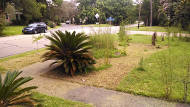
On Tuesday evening as I was finally sitting down and sketching some design plans for the front yard, there was a knock on my front door. I opened the door. It was the neighbor who lives behind me. He started by asking, "Have you seen your front yard? It looks terrible." He complained about the front yard. He complained about the back alley that separates us. I let him finish and then told him I was very offended. Then I launched into telling him my plans for increasing the biodiversity of my yard through introducing native plant species. I said it was a restoration project and I'm still figuring out which species do well and where.
2014 July 27 (Sun)
New seeds and seedlings
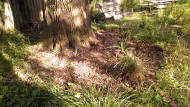
I acquired a whole lotta seeds and plants at the CANPS summer party last night.
2014 July 13 (Sun)
A surprise hit: the back alley
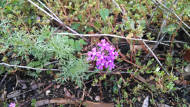
Native biodiversity is steadily increasing. The area that is doing the best is the full-sun back alley, which kind of surprised me. I thought I'd have the hardest time back there because of the blazing hot sun and dry, washed-away soil, but a lot of plants are actually starting to thrive: straggler daisy, partridge pea, lanceleaf coreopsis, purple coneflower, prairie verbena, Maximilian sunflower, black-eyed Susan, and coralbean. Some aren't particularly native to my parish, but Texas isn't that far off and I use the seeds that I've got.
2014 May 16 (Fri)
Coreopsis everywhere
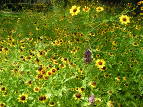
The rain garden is now fully covered with coreopsis. Some clasping coneflowers are coming in along with some horsemint. The tallest plants are roughly 5' tall. It's about time to finally cut the path to the back swing since it's pretty overgrown.
2014 April 26 (Sat)
Hmm... something's missing
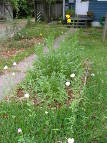
The rain garden has filled out nicely, but I'm noticing a particular lack of something: grasses. I suppose one of my initial-phase goals was to just get some diverse species established, which is why I haven't trimmed any plants from growing between the stepping stones. (They're blocking the last few on the way to the back bench.) Now that they're established and apparently doing well — the tallest plants are 4' tall — I'm waiting for the flowers and resulting seeds. At that time, I think I'll start discouraging some growth.
2014 March 31 (Mon)
The flowers are coming
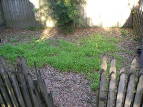
Amazing what a little warmer weather and rain will do for wildflowers in the spring. It's only been two weeks, and I can definitely see a huge difference.
2014 March 18 (Tue)
Babies' first spring
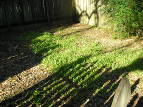
The days have been getting warmer and sunnier. The rate of growth in the rain garden has increased lately, though the plants have generally been growing all winter too. The Chicken Yard sprouts have been growing much more slowly, but I'm not too worried. I can spot some flower buds starting to form, and I'm really looking forward to seeing them open so I can figure out what they even are. Looks like a bunch of Rudbeckia to me.
2014 January 29 (Wed)
Snow can't stop the natives
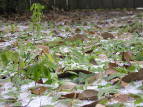
It snowed yesterday and last Friday. Well, it was icy sleet balls. The exotic tropicals and citrus took a beating, but the natives did just fine. This picture shows the Chicken Yard and the layer of ice that's still out there. I read that planting as I did in the fall would let the plants grow roots throughout the winter, but I didn't expect them to grow much above ground. I'm seeing new growth even though it's been pretty cold. One yellow flower even grew a month or so ago.
2013 November 29 (Fri)
Doubt and patience
Growing natives requires patience. I would say moreso than gardening with exotics. This is because of the naysayers as well as personal inexperience with natives. I fluctuate between resolve and doubt when I go out and look at the rain garden, often in the same sitting. One minute, I see great potential and growth. The next, it's just a bare dirt ditch with weeds.